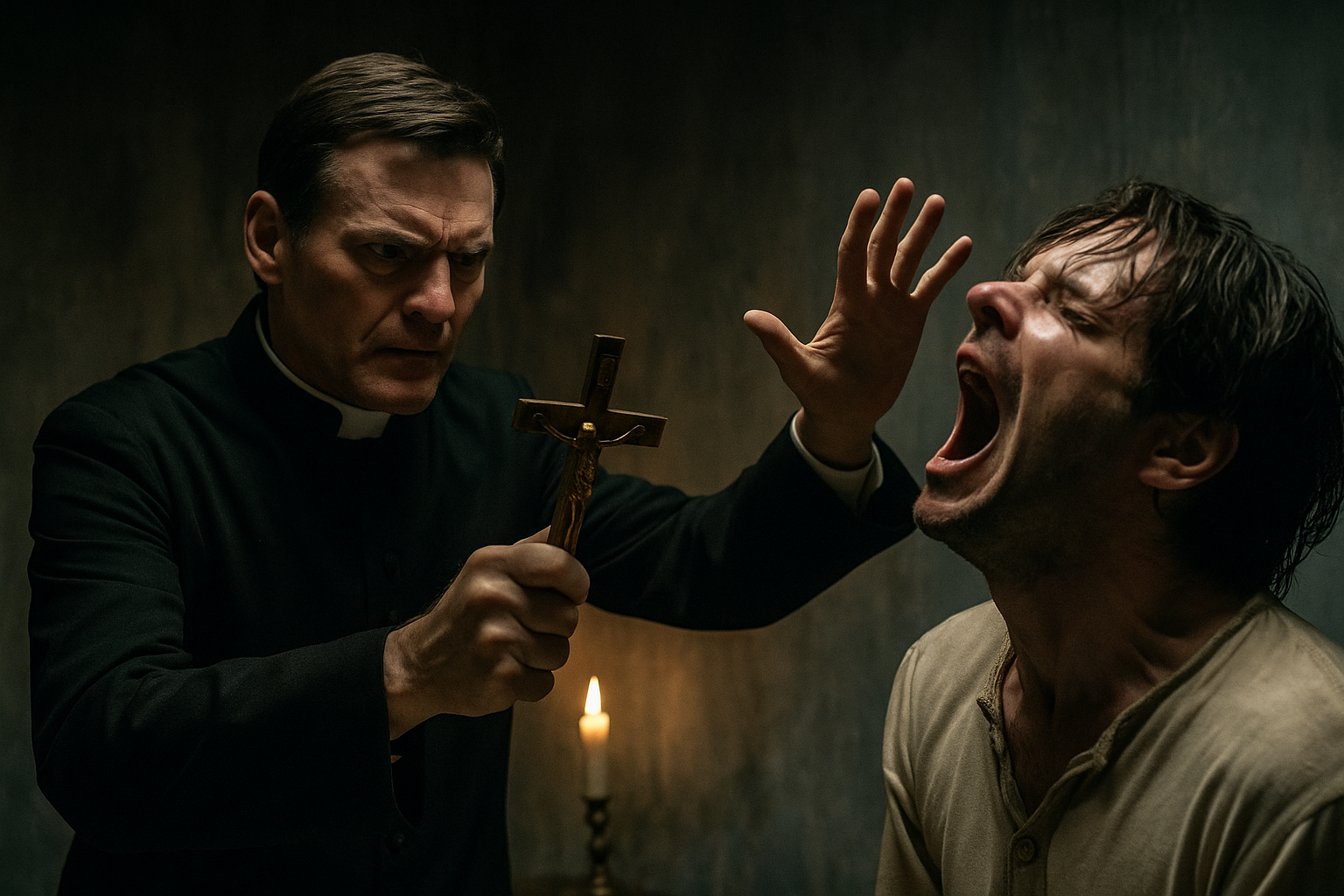A Seed Sown in Shadows
Simon Caldwell wasn’t born with the name that demons would later hiss. He was raised in a modest Christian home in the outskirts of Marseille. His mother sang Psalms as lullabies, and his father—once a carpenter—taught him Proverbs as he measured planks.
But when Simon turned eighteen, he left the Word and the Way behind. The local seminary called it “deconstruction”; his father wept and called it apostasy.
Simon didn’t become a pagan. He didn’t sacrifice goats or chant in the woods. He became empty. The kind of man Christ warned about in Matthew 12:43–45—the house swept, but unfilled.
Years passed. He built cathedrals for men of faith but no longer prayed himself. He married briefly. Lost the child. Buried the wife. Never buried the grief.
He worked in silence, even in winter, laying bricks as penance. But the silence deepened. Thoughts began to slip. He would wake up in unfamiliar places, caked in mud, with no memory. His hands bled without cause. Words he didn’t recognize would form on his lips. He stopped whistling hymns. He stopped speaking altogether.
That’s when they brought him to the monastery.
And that’s when Father Lucien entered the story.
Part I: Ritual
Father Lucien had long been the pride of his order—a careful man, schooled in Rome, fluent in five tongues and eighteen rites. His superiors said he had the gift of discernment. He kept their trust like treasure in a vault.
But what no one knew—not even Lucien himself—was that he had never truly been born again. He had never heard the call in John 3:3: “Except a man be born again, he cannot see the kingdom of God.” He had been catechized but not crucified with Christ. Polished, but not purified.
He prayed to Mary and the saints out of tradition. He invoked relics and ancient prayers, confident in the pageantry of the Church. But when Simon opened his eyes that night, Lucien felt something crack.
“You’ve come to play your part again, Father…”
The demon’s voice slithered across his soul like oil on water. It mocked, yes—but it knew. Knew how to expose his weakness, the hollowness under the habit.
Still, Lucien did what he was trained to do. He read from the Rite of Exorcism. He sprinkled holy water. He quoted traditions—not Scripture. He never opened his Bible. He didn’t carry one.
And the demon played along.
Because demons don’t mind ritual. They only flee at authority. Not institutional authority—but spiritual. Christ’s authority. And Lucien didn’t have it.
Part II: Interruption
After that night, the reports were filed. “Possession subdued.” “Manifestation ceased.” But peace didn’t follow.
The brothers of the order began to see changes—not in Simon, but in Lucien.
He started waking at odd hours. He fasted, but not in prayer. He stopped invoking Mary. He stopped reciting Latin. He began… reading.
The Bible.
It was Psalm 91 that struck him first:
“He that dwelleth in the secret place of the most High shall abide under the shadow of the Almighty.”
Then 2 Timothy 3:5:
“Having a form of godliness, but denying the power thereof: from such turn away.”
Lucien wept. Alone, for the first time in years. He saw the truth: he had never known the Lord. And through that sorrow, the Lord began His mercy.
Lucien repented—not to a priest, but to Christ. In the quiet of his cell, with no incense, no icons, only a cracked Bible and knees bent low, he confessed:
“Jesus, I never knew You. But I want to. Make me Yours. Fill me. Forgive me.”
And the wind outside seemed to still.
Part III: Return
Two weeks later, Lucien returned to Room 9. He brought no incense. No relics. Only a worn Bible and a trembling heart.
Simon was still there. Still restrained. His skin was waxen, but his eyes gleamed—feral, sharp.
“You look different,” the voice sneered. “Changed costumes?”
Lucien opened his Bible—not to cast a spell, but to declare truth.
“Behold, I give unto you power… over all the power of the enemy: and nothing shall by any means hurt you.” (Luke 10:19)
Simon’s body seized violently.
Lucien stood firm. “This is not a ritual. This is war.”
“Submit yourselves therefore to God. Resist the devil, and he will flee from you.” (James 4:7)
“No saint will save you,” the voice rasped. “Your Jesus doesn’t want you.”
Lucien stepped closer. “My Jesus bled for me.”
And then, quietly, without screaming or smoke or flame—Simon collapsed.
No applause. No theatrics. Just a man weeping, like a storm had passed.
“Where… where am I?” Simon whispered.
Lucien laid a hand on his shoulder. “You’re free.”
Aftermath: The Real Deliverance
Simon recovered slowly. Deliverance is not always dramatic; it’s often daily. He confessed Christ. He was baptized—not into an institution, but into the body of believers.
Lucien left the order months later. He no longer called himself “Father,” for as Matthew 23:9 says:
“Call no man your father upon the earth: for one is your Father, which is in heaven.”
He opened a small gathering in the countryside. They met in barns, kitchens, and fields. They read the Bible. They prayed in the name of Jesus alone. They laid hands on the sick. They preached repentance and resurrection.
Some mocked. Others joined.
But the demons never played pretend there again.
They only fled.



